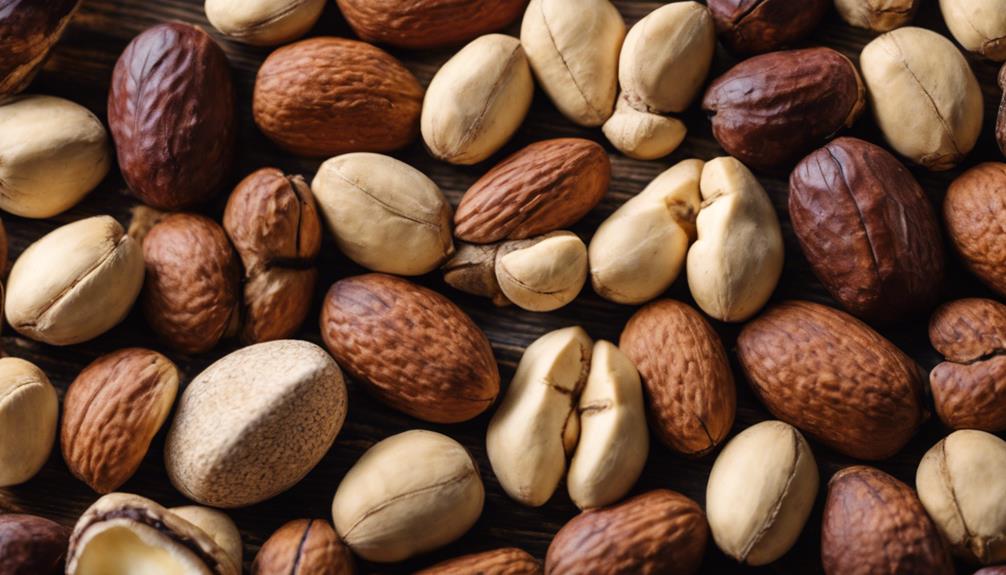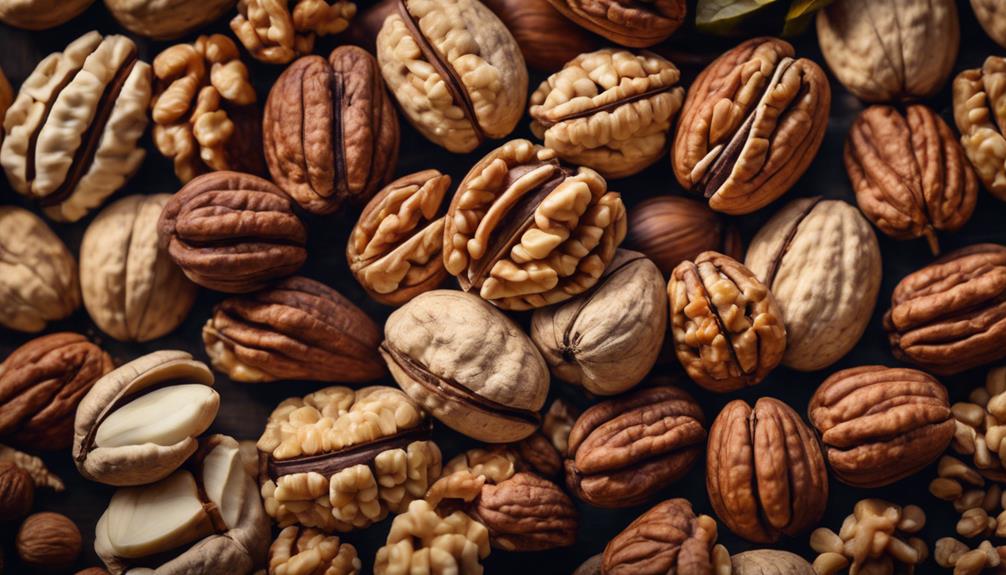What Nuts Can a Dog Eat
Dogs can enjoy almonds, peanuts, and cashews in moderation, but steer clear of macadamia nuts and pecans to avoid potential harm. Remember to be cautious and closely monitor for any signs of distress after feeding your dog nuts. If you want to guarantee your furry friend's safety and health, it is essential to understand which nuts are safe and which ones are best avoided.
Key Takeaways
- Almonds, peanuts, cashews, Brazil nuts are safe in moderation.
- Avoid macadamia, pecans, walnuts due to toxicity or high fat content.
- Hazelnuts and chestnuts require caution, watch for choking hazards.
- Monitor for signs of nut poisoning like weakness, vomiting, seizures.
- Consult a vet for treatment options if nut poisoning is suspected.
Almonds

When feeding your dog almonds, remember to do so sparingly to avoid any potential digestive issues. Almonds for dogs can be a good source of healthy fats, protein, and fiber. However, caution is necessary with the amount you feed your furry friend. Moderation is key when it comes to almonds, as they are high in fat and calories. Stick to small portions and avoid salted or flavored almonds, as these can be harmful to your pet. Safe serving sizes of almonds for dogs can range from 1-2 almonds for small breeds, up to 5-10 almonds for larger dogs. Always monitor your dog for any signs of stomach discomfort or allergies when introducing almonds into their diet.
Peanuts
When it comes to feeding your canine companion peanuts, it's important to be aware of the safe nuts for dogs and the health benefits that peanuts can offer. While peanuts can be a tasty treat for your furry friend, it's imperative to remember that moderation is key. Keep in mind that some dogs may have allergies or sensitivities to peanuts, so it's best to introduce them cautiously and observe for any adverse reactions.
Safe Nuts for Dogs
Peanuts are generally considered safe for dogs to consume in moderation, but it is important to be aware of potential risks associated with feeding them to your furry friend. When offering peanuts to your dog, remember to keep in mind the following:
- Nutritional Value: Peanuts are rich in protein and healthy fats, providing a good source of energy for your pup.
- Safe Consumption: Always give plain, unsalted peanuts to avoid any potential issues with added seasonings.
- Allergies: Some dogs may be allergic to peanuts, so introduce them slowly and watch for any adverse reactions.
- Choking Hazard: Whole peanuts can pose a choking hazard, so consider crushing or chopping them before serving.
- Portion Control: Too many peanuts can lead to obesity, so make sure they are just an occasional treat.
Health Benefits of Peanuts
Before offering peanuts to your dog, it's important to understand the potential health benefits they can provide. Peanuts are a good source of protein, healthy fats, and essential nutrients like niacin, vitamin E, and magnesium. They also contain antioxidants that can help reduce inflammation and support heart health. However, it's essential to mention that some dogs may have nut allergies, including peanuts. If your dog has a history of nut allergies or sensitivities, it's best to avoid feeding them peanuts. In such cases, peanut butter alternatives like sunflower seed butter can be a safer option. Always monitor your dog for any signs of allergic reactions when introducing new foods, including nuts, into their diet.
Cashews

While cashews are generally safe for dogs to consume in moderation, it is important to be aware of potential risks associated with feeding them to your furry friend. Some dogs may have cashew allergies, so it's essential to monitor for any adverse reactions. Additionally, cashews are high in fat, which can lead to gastrointestinal upset or pancreatitis if consumed in large quantities. When feeding your dog cashews, make sure they are unsalted and not coated in any flavorings that could be harmful. Cashew butter for dogs can be a tasty alternative, but always check the ingredients to avoid harmful additives. Remember, moderation is key when it comes to treating your dog with cashews.
- Watch out for cashew allergies
- Monitor fat intake
- Choose unsalted cashews
- Check for harmful additives
- Opt for cashew butter when possible
Hazelnuts
When it comes to hazelnuts and your furry friend, it is important to understand the risks and benefits associated with this nut. While hazelnuts are not toxic to dogs, they can pose a choking hazard and be high in fat, potentially leading to gastrointestinal upset. As with any new food, moderation is key, and it's advisable to monitor your dog for any signs of adverse reactions when introducing hazelnuts to their diet.
Hazelnuts for Dogs
Hazelnuts can be safely consumed by dogs in moderation, but it is important to be aware of potential risks associated with feeding hazelnuts to your furry companion. When using hazelnuts for training treats or incorporating them into homemade dog food recipes, consider the following:
- Choking Hazard: Hazelnuts can pose a choking risk, especially if fed whole.
- High Fat Content: Excessive consumption may lead to stomach upset or pancreatitis.
- Mold Contamination: Moldy hazelnuts can be toxic to dogs.
- Allergic Reactions: Some dogs may be allergic to hazelnuts.
- Portion Control: Limit the amount of hazelnuts to prevent digestive issues.
Always consult your vet before introducing hazelnuts or any new food into your dog's diet.
Hazelnuts Health Benefits
Consider incorporating hazelnuts into your dog's diet mindfully, as they offer various health benefits when given in moderation. Hazelnuts can be a nutritious addition to your canine companion's diet when served appropriately. These nuts are rich in healthy fats, vitamins, and minerals that can support your dog's overall well-being. However, bear in mind that hazelnuts should only be given as an occasional treat due to their high-fat content. When preparing hazelnuts for your dog, make sure they are unsalted and free from any flavorings that could be harmful to your pet. Always consult with your veterinarian before introducing hazelnuts or any new food into your dog's diet, particularly if your dog has specific dietary restrictions or health conditions.
Hazelnuts Serving Suggestions
If planning to incorporate hazelnuts in your dog's diet, ensure they are served in appropriate portions and preparation methods to maintain the health benefits they offer. Hazelnuts can be a tasty and nutritious addition to your furry friend's diet when served correctly. Here are some suggestions to keep in mind:
- Crushed Hazelnuts: Sprinkle crushed hazelnuts over your dog's meal for added texture and flavor.
- Hazelnut Butter: Use hazelnut butter as a delicious and healthy spread on your dog's treats.
- Hazelnut Bark: Make a special treat by mixing crushed hazelnuts with dog-safe ingredients to create a homemade bark.
- Hazelnut Allergies: Be cautious of hazelnut allergies in dogs; consult your vet before introducing hazelnuts into their diet.
- Control Portions: Limit the amount of hazelnuts given to prevent any digestive issues or excessive calorie intake.
Pecans
When feeding pecans to your dog, exercise caution as they can pose a potential risk to their health. While pecan recipes might sound tempting, it's crucial to be aware that pecans are high in fat and can lead to gastrointestinal issues like pancreatitis in dogs. Additionally, pecans contain a toxin called juglone, which can be harmful to your furry friend if consumed in large quantities. Despite their nutritional value for humans, dogs have different digestive systems and may struggle to process the fats and toxins present in pecans. As a result, it is best to avoid feeding your dog pecans altogether. Instead, opt for safer nut options like unsalted peanuts or almonds if you want to treat them occasionally.
Brazil Nuts

Brazil nuts are a type of nut that should be approached with caution when considering including them in your dog's diet. These nuts are known for their unique taste and high nutritional value, but they can pose risks to your furry friend if not handled properly. Here are some key points to keep in mind:
- Rich in selenium, essential for your dog's health.
- Distinctive creamy flavor that might appeal to your dog.
- Store in a cool, dry place to maintain freshness.
- Avoid giving whole Brazil nuts to your dog; consider incorporating them into homemade treats instead.
- Check out dog-friendly recipes online that include Brazil nuts in safe amounts.
Macadamia Nuts
When it comes to dogs and macadamia nuts, it's important to be cautious as these nuts can be toxic to your furry friend. Signs of poisoning can include weakness, vomiting, and tremors, so it's vital to keep these nuts away from your dog. If you suspect your dog has ingested macadamia nuts, contact your veterinarian immediately for guidance on treatment options.
Toxicity to Dogs
Macadamia nuts can be toxic to dogs, posing a significant risk to their health if ingested. These nuts are dangerous due to their high levels of toxicity. Here are some reasons why they are harmful:
- Toxicity Levels: Macadamia nuts contain substances that are toxic to dogs.
- Digestive Distress: Ingesting macadamia nuts can lead to digestive issues in dogs.
- Neurological Effects: Consumption of these nuts may cause neurological symptoms.
- Muscle Weakness: Dogs may experience weakness in their muscles after eating macadamia nuts.
- Vomiting and Tremors: These symptoms can also manifest in dogs that have ingested macadamia nuts.
It is important to keep macadamia nuts away from your furry friend to prevent any potential harm.
Signs of Poisoning
If your dog has ingested macadamia nuts, it is important to be aware of the signs of poisoning to take immediate action to safeguard their health. Symptoms of macadamia nut poisoning in dogs may include weakness, vomiting, tremors, hyperthermia, and inability to walk. In severe cases, dogs may also experience muscle stiffness, elevated heart rate, and even seizures. It is vital to prevent macadamia nut ingestion by keeping these nuts out of your dog's reach. If you suspect your dog has consumed macadamia nuts and is showing these symptoms, contact your veterinarian or an emergency animal helpline promptly. Quick action is essential in providing emergency care. In the next section, we will explore treatment options for macadamia nut poisoning in dogs.
Treatment Options
Are there specific treatment protocols that need to be followed in cases of macadamia nut poisoning in dogs? When dealing with nut allergies in dogs, especially related to macadamia nuts, it's important to act promptly. Here are some important steps to keep in mind:
- Inducing Vomiting: Your vet may induce vomiting to remove any remaining macadamia nuts in the stomach.
- Fluid Therapy: Providing intravenous fluids can help flush out toxins and maintain hydration.
- Monitoring: Continuous monitoring of the dog's vital signs is crucial for any adverse reactions.
- Medication: In severe cases, medications may be administered to manage symptoms like vomiting or tremors.
- Nut Alternatives: Always opt for safe nut alternatives like unsalted peanuts or cashews for your furry friend's treats.
Pistachios
When feeding your dog pistachios, be mindful of potential risks and monitor for any signs of digestive upset. While the flesh of pistachios can be a tasty treat for your canine friend, the shells can pose a choking hazard and may cause digestive blockages if ingested. It's essential to always remove the shells before offering pistachios to your dog. Concerning nutritional value, pistachios are rich in protein, fiber, and healthy fats, but they also contain high levels of fat and calories that can lead to weight gain if consumed in excess. Additionally, pistachios may cause salt toxicity in dogs due to their salt content. As with any new food, introduce pistachios to your dog's diet in moderation and consult with your veterinarian if you have any concerns.
Walnuts

When including walnuts in your dog's diet, be cautious about potential risks and monitor for any adverse reactions. Walnuts are safe for dogs in moderation and can provide nutritional benefits. Here are some key points to keep in mind:
- High in Omega-3: Walnuts contain essential fatty acids that can help support your dog's skin and coat health.
- Antioxidant Properties: The antioxidants found in walnuts may contribute to your dog's overall well-being.
- Protein Content: Walnuts offer a plant-based source of protein, which can be beneficial for your dog's muscle health.
- Potential Allergies: Some dogs may be allergic to walnuts, so introduce them gradually and observe for any negative reactions.
- Avoid Moldy Walnuts: Moldy walnuts can be toxic to dogs, so always make sure the walnuts are fresh and free of mold before feeding them to your furry friend.
Chestnuts
Curious about whether chestnuts are safe for your furry companion? While plain, unsalted chestnuts can be safe for dogs in moderation, there are a few things to take into account. Roasted chestnuts, commonly found during the holiday season, should be avoided due to the high fat content and potential seasonings that could be harmful to your pet. Additionally, chestnut recipes often involve ingredients like sugar, salt, or even chocolate, which are all toxic to dogs. If you want to share chestnuts with your pup, make sure they are plain, cooked, and served in small amounts to prevent any gastrointestinal issues. Always consult with your veterinarian before introducing new foods to your dog's diet to guarantee their safety and well-being.

If Richie Bedard is a dog food expert, author, or any other figure in the field of dog nutrition that emerged after September 2021,






